Caretaker Venezuelan leader Juan Guaidó, elected by the National Assembly, presents the need for a plan of national salvation – an agreement concluding in free and fair elections while defending human rights.
In a feature-length interview, the opposition leader explains Argentina’s potential role in the negotiations while marking out the shades of difference between the positions of Alberto Fernández and Cristina Fernández de Kirchner.
He warns that democracies must look out for the “alarm bells” announcing the imminence of authoritarianism.
What does the salvation plan for Venezuela consist of?
The situation is very worrying due to the humanitarian crisis, the situation of the refugees, the hunger and the lack of vaccinations. We are talking about an agreement for national salvation, pushed by the humanitarian emergency.
There are over six million refugees and emigrants. Today we need the World Food Programme to attend to the famine unleashed in our country. We propose uniting all the efforts over the years, building a majority, mobilising people, domestic pressures, the struggle for decent pay with today’s minimum wage in Venezuela barely US$3 a month but also vindicating a life with dignity and respect for human rights. To that should be added international pressures, the sanctions for the human rights violators and the corrupt, geared to a solution to the conflict leading to free elections with an electoral timetable permitting the election of a new president to restore the country’s institutions and justice to be done in that ongoing International Criminal Court trial on behalf of the victims of human right violations which have been defined as crimes against humanity.
We know that this must pass through a process of negotiation and we know the natural scepticism aroused by having to face a dictatorship. Today the big differential factor with regard to the previous processes is the support of the international community and the clarity in identifying Nicolás Maduro as a human rights violator, thus lending certainty to the solution of this terrible conflict.
You proposed amending the electoral calendar formally scheduling presidential elections for 2024 to unify it with this year’s local elections and, in exchange for that, progressively lifting sanctions in proportion to the compliance of the Maduro government.
The central point is solving the conflict. We Venezuelans are owed a presidential election, of which Maduro robbed us in 2018, and that’s why the world considers him a dictator. The entire world and 60 nations consider me a caretaker president, according to Article 233 of our Constitution.
The central point of this agreement is the acceleration of the presidential elections to solve the conflict, generating confidence in the country and in the system of justice, including, for example, the electoral courts. Allied countries would thus be more disposed to progressively lift the sanctions against the human rights violators and the corrupt who still support Nicolás Maduro. There can be no amnesty for the violation of human rights, which is beyond the statute of limitations. Only the justice system can provide such guarantees but we can talk about it. And this also implicates our allies because at the end of the day Maduro is not only a threat to Venezuela but to the security of the whole continent. He shelters terrorists, financing drug-trafficking directly or indirectly out of Venezuela. The guerrilla leader Jesús Santrich was recently killed and the Maduro régime has yet to report it, precisely because they were protecting him in Venezuela. That’s why the guarantees of our allies are so important.
Is it possible to reach an agreement with the Nicolás Maduro government?
One element is the pressure of the international community on Maduro and his régime. We Venezuelans who want a change are the majority. The key is to put into words the objective of free and fair elections, which is also related to international law. We were referring to the International Criminal Court. The unification of the democratic factors in Venezuela precisely requiring a solution via free elections, the discontent and Maduro’s lack of popular support these days are part of the tools.
The international community continues to be a key factor. It’s important not to relativise what is happening in Venezuela, not to treat a dictatorship as something normal but to identify it precisely in order to approximate solutions. We’re sceptical because we know what we are facing but we’re also aware of the tools we combine, the capacities constructed, the pressure and the clear denunciations on the part of most of the international community and the domestic leadership in Venezuela to carry forward not just a negotiation. Maduro wants more negotiations but that’s not enough. Venezuela does not need more failed negotiations, it needs a solution to conflict producing an agreement for national salvation.
Maduro’s entourage and régime, including the Armed Forces, are weakened, the product of a majority requiring democracy. It’s very clear to them that there is no solution or protection, not even with Maduro. Even they in a different way are seeking to recover the country.
Does the current economic and public health crisis make the difference? Could being able to use the country’s oil money be necessary in this case?
Without a doubt. We’re not depending on the good faith of a dictatorship – on the contrary, we trust in international and domestic pressure. Maduro is not interested in our people’s welfare, as we Venezuelans are, he is only interested in [his] guarantees. That’s why the disposition of our allies to progressively lift sanctions is interesting because that does interest him.
In the country with the world’s biggest oil reserves, there is no petrol. At this moment the indicators of hunger in Venezuela are the same as for Congo or South Sudan while the number of refugees only compares with Syria, a country in conflict. That’s what we Venezuelans are facing and that gives us a possibility, thanks to our democratic resistance and the constant denunciations of allied countries. In the case of Argentina, to make the crisis visible while also presenting alternatives for a solution.
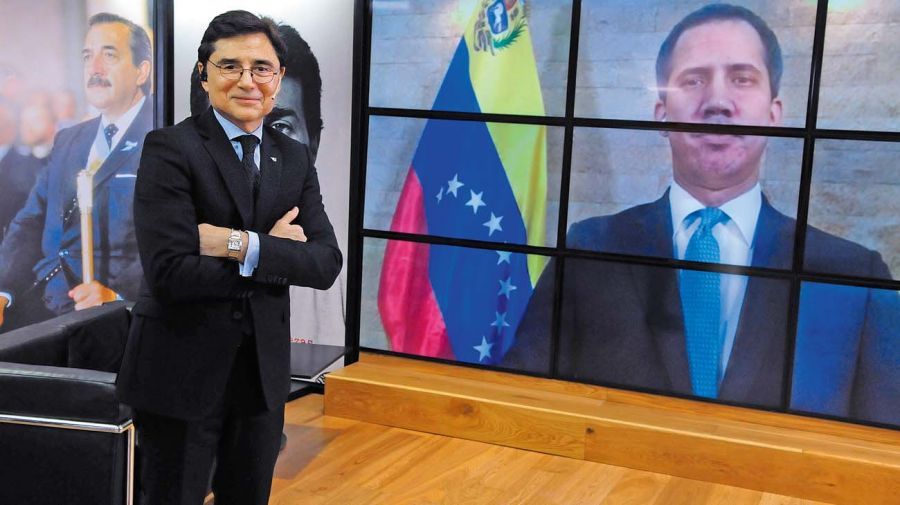
When Argentina recently withdrew from the human rights denunciations against the Maduro government at the International Criminal Court in The Hague, you were careful to avoid a very harsh response. In fact Julio Borges – who said that he had held a reserved meeting in Quito with Foreign Minister Felipe Solá – spoke on your behalf saying that the result of the conclave was that the Venezuelan opposition and the Casa Rosada considered that President Alberto Fernández could be chosen to mediate. Can I take that statement and your own moderation as looking kindly on the possibility of Alberto Fernández being a mediator and helping out in your process of national salvation?
Venezuela is in a situation of great vulnerability as a republic. Its citizens and we ourselves as the democratic alternative are in a situation of great vulnerability. There are no vaccines nor were there any via the Covax system even though we have been insisting since December on being allowed to enter them in the country.
We must rally all the necessary support to find a solution to this conflict. I consider the exit from the Lima Group or even the withdrawal of the denunciation at the International Criminal Court of crimes against humanity in Venezuela to be a political statement. It does not have any practical effect, not even at that Court, given the current state of investigation and the reports produced by the United Nations and independent missions. We’re not looking for sympathy, we are seeking support, solutions and political actions leading us to resolve this conflict and consolidate a solution to this tragedy which affects not only Venezuelans but also the entire region and continent.
One interpretation of the Argentine attitude is that Alberto Fernández is awaiting a wink or green light from the United States, according to the conversations in Quito with Juan González, Biden’s advisor for the region, and while he waits, he is trying to regain ground from Maduro’s mistrust, abandoning all aggressive actions by Argentina against his régime. Is that a likely interpretation?
Without considering whether it is plausible or not, the Venezuelans and the continent need any support to emerge from this tragedy. Some things cannot be relativised or evaded, like the violation of human rights, among other things.
Whether or not to approach the régime has to do with how we characterise what is going on in Venezuela. The solution is to arrive at free and fair elections to resolve the crisis. Argentina is disposed towards approximating a solution to the migration questions but it would be [too] early for interpolations of that kind when there’s still a way to go for any agreement.
When looking at the relationship between Alberto Fernández et al, there seems a certain logic in that attitude. Diosdado Cabello said of Alberto Fernández: “Lukewarm no, cold … Fortunately I’m a free man. It makes you sad to see a scenario with Venezuela and Argentina marching together and now this lukewarm approach separates them. Argentina’s president does not like being called lukewarm but he goes wild when Venezuela gets called a dictatorship. His Foreign Minister Felipe Solá speaks against Venezuela every chance he gets. They know that there is no dictatorship here but a president who won [an election]. Don’t get upset, Mr Fernández, if you’re lukewarm, deal with it. In Venezuela we’re boiling-hot revolutionaries and we don’t beat around the bush or go dithering [guabineo, in Venezuelan slang].” Does the opposition in Venezuela perceive the effort being made by the Argentine government to stay equidistant?
It is no secret that the vice-president of Fernández is Cristina [Fernández de] Kirchner, who was very close to Hugo Chávez and also to Maduro. It would interest us to make her understand that this is a dictatorship, so that she can press for an agreement to be reached to solve the crisis, sending the correct messages. The posturing of Diosdado Cabello or Maduro is not only insolent but also reflects certain internal differences within the PSUV ruling party. The role of Argentina should be no different from defending human rights and speaking clearly. Those two things can go hand in hand, they can be on the same page.
But do they see the effort to be neutral over and above the bad relationship of Alberto with the heirs of Hugo Chávez? Here it is being interpreted as a fresh wink to the régime that Venezuela’s Vice-President Delcy Rodríguez was invited by Chargé d’Affaires Eduardo Porretti to the national day reception at the Argentine Embassy on May 25 and received with lavish praise.
It’s a work in progress. The important thing would be to reach an agreement. That would be very productive for Venezuelans. That is different from relativising what is going on in our country.
The violation of human rights, filed as crimes against humanity, is a fact recognised even by the dictatorship. They said: “We killed Navy Lieutenant-Commander [Rafael] Acosta Arévalo.” They tortured him to death. They killed Fernando Albán, even though they had said for four years that he committed suicide. They abducted him upon arrival at the airport, smothered him and threw him out of a window. They made his family believe that he had committed suicide, only recognising recently that they had murdered him in order to improve their standing with the International Criminal Court.
A distinction must be made. We need to seek ways to approach the régime and send whatever messages we can. Argentina can play a role here, referring to Cristina Kirchner’s proximity to the Maduro dictatorship – Mexico has done something similar, for example.
During the last year of [Argentina’s 1976-1983] military dictatorship. I remember spending many nights sleeping on a couch cooped up inside the Venezuelan Embassy in Buenos Aires, when my guard happened to be the military attaché, who took pride in Venezuela being one of the very few countries in Latin America not to have had a military dictatorship and being an example of democracy. When democracy returned here, that diplomat was still serving here when I returned from exile. He told me that Raúl Alfonsín was mistaken in thinking that a civilian government could judge an armed military, that there could be no Nuremberg here because they had the guns. But he was the one mistaken. What way out would Venezuela’s régime have now other than its leaders going to jail for life? I wonder if some kind of safe conduct would not be important.
That’s a very important question, above all from the way the trial at the International Criminal Court is going against Maduro. All that can be expected from such a trial for human rights violations is justice. The great challenge is how we achieve justice but also save lives and prevent the biggest emigration in the recent history of the continent, as well as vaccinating and saving the doctors and nurses on the front line of defence against coronavirus. And all these battles have to be fought simultaneously.
This trial reached the International Criminal Court because it was turned back by the Venezuelan courts due to the sheer number of systematic human rights violations by the Armed Forces. The orders came from [the] Miraflores [presidential palace]. There were also extrajudicial executions by special hit squads, as determined by the special independent report of the United Nations on Venezuela. Everything must be resolved in court. The negotiations, the dialogues or the agreements are independent of the International Criminal Court trial. Recovering justice, the judicial system, the separation of powers, guarantees against a repetition of these terrible situations by the Venezuelan state, compensating the victims with damages, healing the words of society is what would permit justice to be done, resolving Venezuela’s conflict. Nicolás Maduro and Diosdado Cabello will have to demonstrate their innocence, showing whether they committed crimes or not.
Would it be [too high] a price to pay justifying salvation and pacification in Venezuela if the government leaders were to fly off to Cuba?
That was exactly what happened in Venezuela in 1958. When the dictator Marcos Pérez Jiménez flew off to another country, a junta with both civilian and military members was formed and free elections were held. We could not speak of impunity due to the level of the crimes committed by this régime, we can only speak of justice.
But if we were to ask Venezuelans for that option, they would say that they were ready to have a whip-round to pay the tickets. Enough money to pay their flights would easily be collected. The level of tragedy which we Venezuelans are undergoing is very great but we cannot renounce the quest for justice as a society. We must carry on that struggle along parallel lines, seeking in the short term to stabilise the country, revert the emigration and attend to a complex humanitarian emergency turning into catastrophe.
We need multilateral aid and a broader humanitarian spectrum. That’s why we speak of guarantees for all parties to the agreement, including the heirs of Hugo Chávez.
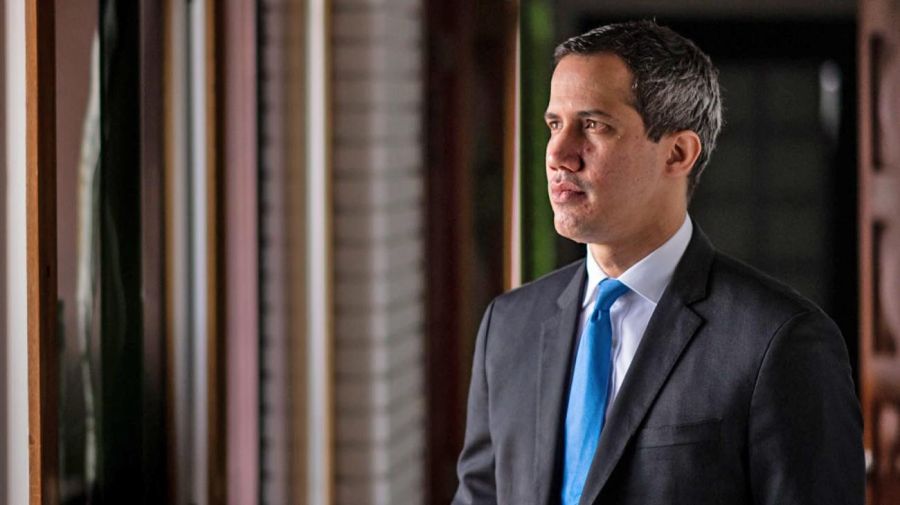
As of May 30, the Venezuelan Health Ministry has reported a total of 230,147 confirmed cases of coronavirus contagion and only 2,595 deaths. Are those numbers credible?
Absolutely not. Unfortunately there is not even the capacity for testing in Venezuela. Approximately 300,000 test kits arrived via the Pan American Health Organisation [OPS, in the Spanish acronym] and not even five percent were used. Many of these test kits went onto the black market – such contraband in medicine is the product of corruption. That is also what happened to the few vaccines to enter Venezuela. Over a million vaccines must be coming into Argentina via the Covax system while 700,000 went to Iran but to Venezuela zero.
The dictatorship’s figures are absolutely implausible, beyond belief. They lack even the capacity to test. Those “official” figures released by the dictatorship are limited to the doctors and health workers who die. In Venezuela’s case, according to the régime’s own figures, they represent around a third of the total. Our health workers are the hardest-hit in the world due to the lack of vaccines while Maduro shows off on public television how to be vaccinated. Venezuela’s doctors and nurses have not received sufficient doses to be able to protect themselves.
The pandemic was managed in police state fashion in Venezuela in order to generate social control, not according to scientific or public health criteria. We insist on vaccination via our technical panel where OPS, and UNICEF among other organisations and members of both our caretaker government and the régime sit to try and produce a precise plan of vaccination to give priority to the most vulnerable, the elderly, the health sector, chronic patients, etc. They discriminated, applying vaccination to possession of the “carnet de la patria” document held by adherents of the régime.
Which vaccines have been applied in Venezuela and how many?
The dictatorship’s data are very opaque. They have publicly announced around 800,000 Sputnik vaccines and a similar number for Sinopharm. Last December Maduro announced 10 million doses so not even eight percent of what was promised at that moment and zero vaccines via the Covax system, unfortunately. According to the dictatorship’s own figures, not even 0.8 percent of the population has been vaccinated until now, which, of course, rings an additional alarm.
In Venezuela the patients with Covid-19 queue up to fill their oxygen pumps and attend to their families. Treatment is incredibly costly. If you fall ill, the clinics are saturated because the hospitals do not have the capacity to attend to patients. Many prefer to stay home using almost artisanal medicine as palliatives. Via international aid and protected funds we managed to channel directly to the health sector a donation, a direct subsidy, a bond dubbed “heroes of health” of US$100 monthly. Nearly 70,000 registered, between doctors, nurses, stretcher-bearers and other workers of the sector, and we have succeeded in alleviating in this way the situation of the front line of defence against the virus. But it is not enough when not even the vaccines via the Covax system could enter.
Why is Venezuela, as you say, a failed state? A failed state cannot be exported. It could have been a state which worked like the Cuban. What are the main differences?
At first in Venezuela we spoke of “Cubanisation” in reference to what happened on that island and its loss of democracy. Democracy is always at stake. It’s not a gift or a concession but a constant struggle for the separation of independent powers, for transparency, for accountability, for presenting results to the citizenry and keeping promises. In Venezuela’s case it was progressive. There were early alarm bells which unfortunately were not attended – attacks on the freedom of speech, the takeover of branches of government, the political use of the courts as a tool. You always have to be on the alert. The best antidote is the counterweights: a strong opposition, an attentive citizenry, reinforced institutions.
Now we’re at another stage. The dictatorship has lost control. It was never in the plans of Maduro or Chávez to take the PDVSA state oil company from producing three million barrels a day to under 400,000 as now. This was the main source of revenue not only for the country but for their own cash flow to be used to finance campaigns in other countries. The corruption, the indolence, the incompetence and the political control led to the dictatorship going adrift. Even territorial integrity and sovereignty are today at risk. In the case of Cuba there have been no armed groups rebelling against the Army or the security forces, as is happening in Venezuela. But let us have no doubt that they tried to extrapolate or export their model via financing or via the destabilisation of violent groups. It’s happening in Colombia even if there are also Colombians pressing their own claims.
That’s why I call for attention to be paid to these early alarm bells. In every Latin American country we need to strengthen the institutions and hold dictators responsible. Nicaragua is applying the same method as Venezuela: disqualifying candidates. It’s happened to Cristiana Chamorro, who is being persecuted with attempts to throw her into jail. It’s very painful to speak of “Venezuelisation” because it refers precisely to what we are trying to avoid at the moment, a negative example for those of us who are also fighting to regain democracy.
With 5,000 to 8,000 percent inflation and wages worth US$3, the régime is finally no longer sustainable. The problem is the internal implosion which sooner or later will become an explosion.
Our people have rebelled via protests and with their vote in 2015, when we won two-thirds of the Parliament. Repression is what still keeps Maduro going. Misery cannot be exported – nobody wants to receive it. In Venezuela, Cuba and Nicaragua there were early alarm bells...
What is Venezuelan middle-class life like these days?
In general the middle class is pauperised, 90 percent of the population is impoverished. The savings capacity is very limited. The cost of living has shot up due to the low capacity of domestic production. We are dependent even at the level of food. The World Food Programme speaks of 9.1 million at risk of famine in Venezuela when we have the capacity for agricultural self-sufficiency. The middle class is badly hit. The emigration comes mainly from the middle class looking for a quality of life and future for their families.
Recently a photo of a grandmother crossing the Río Grande at the frontier of Mexico into the United States went viral. They are middle-class people who have sold their house and car to pay off some coyotes. The poorest of them walk all the way to any country in Latin America seeking refuge but above all seeking to send money to Venezuela to help out their families.
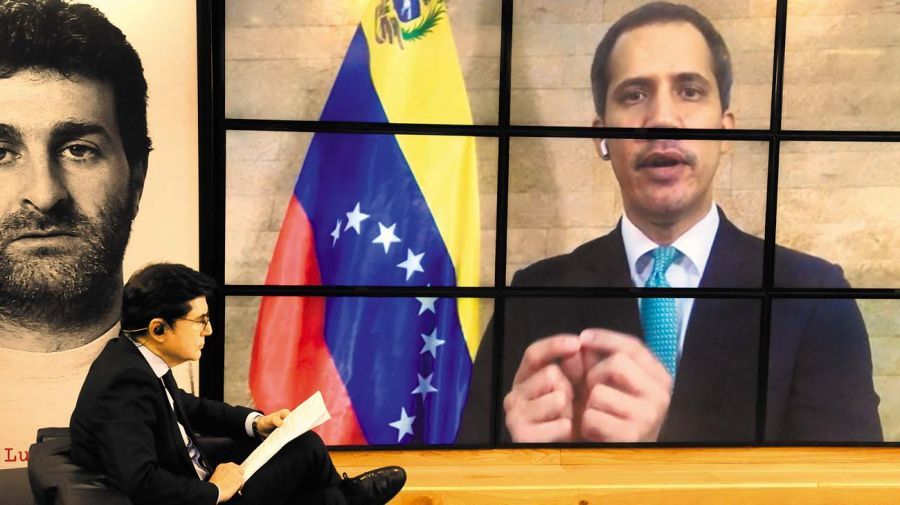
You say that 90 percent are poor today. How many were poor before Chávez? And did things get better before they got worse?
I don’t remember the exact figure. They spoke of 46 percent of poverty before Chávez arrived on the scene. I was then 15 years old and living in a lower middle-class household in the state of Guaira near the capital. I had the opportunity to go to university, graduate and work in a company. Then came the commodities boom and the oil boom when the barrel topped US$100 and public revenues were very high. There was money circulating in the streets in those times, which led to poverty being somewhat diminished.
Many subsidies were implemented in the times of Chávez. They did not save up in the years of the fat cows, they squandered the money of all Venezuelans, they did not invest in infrastructure nor diversify the economy. That was pretty elementary, speaking in macroeconomic terms. Today we have the worst poverty in the 200 years of Venezuelan history. Public revenues should also be always scrutinised by society in its entirety. We Venezuelans are paying a very high price for not paying attention early on.
What message would you give Alberto Fernández as to his possible contribution to Venezuela’s pacification?
We are hoping for Argentine support, including President Fernández, to support with all the power at their disposal an agreement of national salvation beginning with free and fair elections on the road to institutional and human recovery with respect for human rights and personal integrity. In order to heal the wounds from over 20 years of political and social conflict leading to a deplorable humanitarian catastrophe.
I know we can count on the support of Argentina’s Congress. The defence of human rights includes us all. Argentina, as you well know directly, underwent a dreadful dictatorship. We are fighting for the same things for which Argentines fought at that time. Our petition is simple: respect human rights, give us free elections and let us recover our country as soon as possible, ending for once and for all the sufferings of millions of Venezuelans who yearn to return to their country, reunify their families and see our nation flourish once again.
‘Both language and culture bring us closer to the Pope and Argentina’
The Nova news agency said recently that Pope Francis would like to reaffirm papal neutrality and organise a face-to-face meeting between you and Maduro in the Vatican, first one-on-one and then with Vatican intervention. What is the papacy’s role?
I could not confirm that information. The Church has a very important role at the moment. Given the decomposition of the state, the social activism of Caritas, for example – which has a vast scope like few other NGOs or foundations in Venezuela’s case – is crucial.
Venezuela is a profoundly Catholic country. Most of the country belongs to that religion and in my case I preach it. Venezuela’s bishops are clear about the emergency because they live it every day. They have access to not only the information but also the pain.
The Vatican has an important role in all this process. It can function as a guarantee and not only of peace, which is not just the absence of conflict – it is easing the suffering and stabilising the country so that the people can develop it fully and recover prosperity. We express our hopes for a productive role from the Church in the conflict.
The Church is not neutral in Venezuela’s case – there’s no such thing as neutrality when human rights are violated. That would be taking sides with the oppressor.
Does the fact that Pope Francis is Argentine increase the chances of an Argentine president contributing to the plan of national salvation?
The Pope is Argentine, Latin American and a Jesuit. I graduated from a Jesuit university in the year 2000. Both language and culture bring us closer to the Pope and Argentina.
I know that Argentines are profoundly moved by what is going on in Venezuela. Many have Venezuelan friends and colleagues. They know about their suffering. I know about the affectionate respect of all Argentines and Argentina in general for the struggle we are carrying forward.
We hope to be able to consolidate and unleash a productive role in some way to stand up to the dictatorship, defend democracy and solve Venezuela’s conflicts via the Vatican and the Argentine government.
related news

Report: Milei mulls right-wing summit as allies advance in Latin America

Rafael Grossi lays out bold reformist vision for troubled United Nations

World is 'ready' for a woman at helm of UN, says Chile's Michelle Bachelet




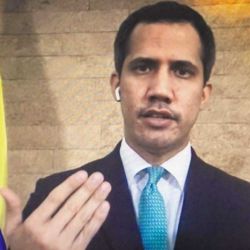



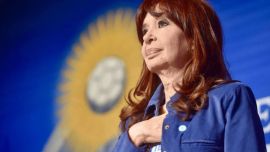











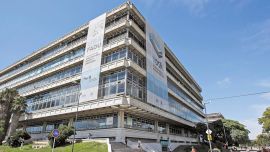

Comments